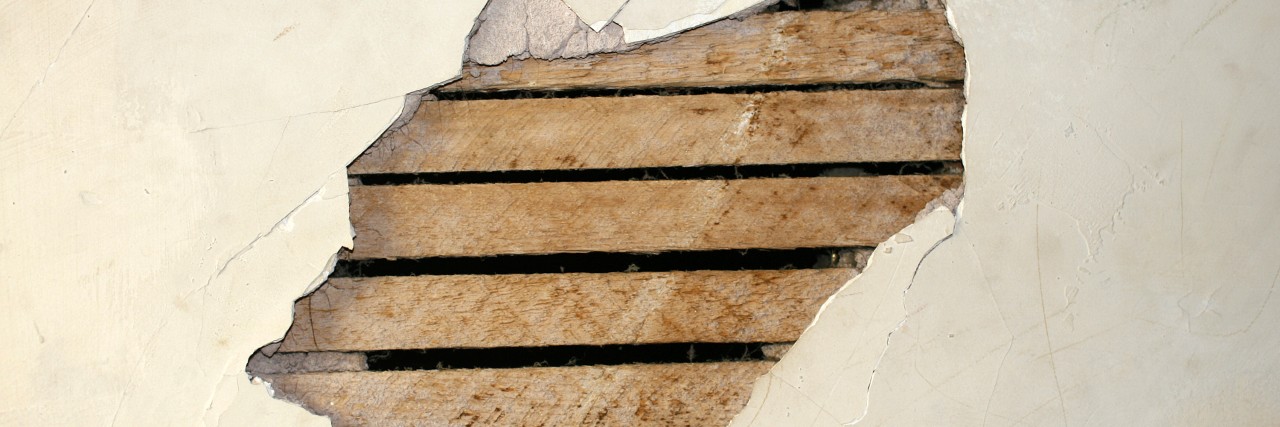A couple of days after I bought new paint for my room, I kicked a hole right in the wall. I created what seemed to be a black hole in the purple (the color I picked out in seventh grade) wall next to my bed and the heel of my foot was covered in dusty white. I shook it off into the covers in my writhing and screamed and screamed for what felt like hours. I was so full of rage, it felt like my body was pulsing. It felt almost electric, a feeling I would later find out was the result of withdrawal from my medication, an SNRI my new psychiatrist had given me without a proper diagnosis.
• What is Bipolar disorder?
It had been three months since I came home from my sophomore year of college in Chicago to my Midwestern town, two hours below. I had been in such a heavy, depressive state, my mind felt like cement and my body like a corpse. It was rare for me to ask for help, but I was doing it and when I got home I was lucky enough to have an appointment with a psychiatrist who immediately gave me a new prescription, after about four years on an SSRI. I always thought I had chronic depression and that my original medication was helping. But what I found out later was the seemingly “great times” were a medication-induced mania. I would write and edit for six newsletters, blogs and magazines at a time, work four different jobs and be with a different boy every day or night. I felt unstoppable. Finally, I was stopped and I asked for the help to get me going again.
I picked out a new white color for my room and I held the weight of the paint can with a feeling of hope and responsibility. I would cover the old paint, though it would take several coats and my room would be clean and new. Buying the paint was the first thing I did after being released from a mental care facility in town. It felt nice to know the psychiatrist and social workers there felt good enough to let me go.
Before I was sent to the mental care facility, I was in the emergency room because I was terrified I would kill myself. This feeling had never felt more prominent than it did that night, when I couldn’t help picturing killing myself to take me out of the body that felt like a vessel helplessly controlled by a malevolent brain. I told my boyfriend, who told my mom, who took me to the hospital. From there, I was sent to respite care, respite simply meaning “rest,” where I would meet with a psychiatrist every day at 7:30 a.m. It was there I truly realized asking for help saved my life.
At respite, I was finally diagnosed with bipolar II, after speculations from my therapist I had been seeing since high school. There, they quickly weaned me off the second medication and prescribed me with an high amount of two different drugs meant for bipolar disorder. I felt fantastic. It helped me sleep, but not too much and I even felt good enough to work on a paper. Soon after, they let me go home.
A couple days later, the withdrawal symptoms reared their ugly heads. I sweat through all of my clothes, felt on the verge of vomiting constantly and was so dizzy I couldn’t stand up to eat or go to the bathroom. I had a feeling of electricity in my hands, feet, ears and eyes. I couldn’t look at a computer or read a book. I was bedridden, staring at my purple walls and popcorn ceiling. I knew it was the medication. I immediately stopped the new medication and swore off the previous medication for the rest of my life. It felt as though my brain was full of pills like pretty toppings, mixed at an old ice cream shop and then scooped out and sold. I was so physically ill. It was here I asked for help again.
I was admitted to the hospital for my physical symptoms and stayed here for a few days. I was given a new medication. The storm of medications had me stuck. It was as if I kept reliving the worst day of my life over and over again, an odd sort of groundhog day. I thought going home from school was the worst day of my life. I thought my depressed days in bed and sweaty pajamas were the worst days of my life. I thought the day I almost killed myself was the worst day of my life. I thought the day I kicked the hole in my wall was the worst day of my life.
But the importance of these days was each time, I knew to ask for help. And the help was given to me. Since then, I’ve learned to view my life in relative terms. Yes, today might feel terrible and endless, but at least I’m not stuck in bed. Yes, today I may have reverted to some old habits, but at least I no longer feel the effects of the wrong medication. Yes, today I may have cried three times, but at least I am back at school. Yes, today may suck, but at least I fixed the damn hole in the wall and painted over the purple of the past.
Editor’s note: Please see a doctor before starting or stopping a medication.
If you or someone you know needs help, visit our suicide prevention resources page.
If you need support right now, call the National Suicide Prevention Lifeline at 1-800-273-8255 or text “START” to 741-741.
Image via Thinkstock

